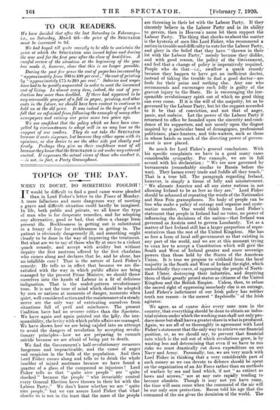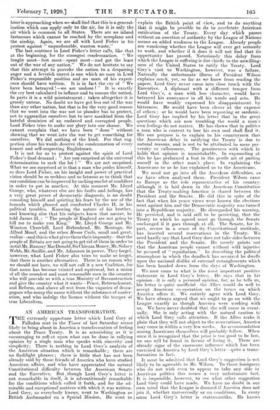TOPICS OF THE DAY.
WHEN IN DOUBT, DO SOMETHING FOOLISH !
IT would be difficult to find a good cause worse pleaded than in Lord Fisher's letter to the Times of Monday. A more fallacious and more dangerous way of meeting a grave and difficult situation could hardly be imagined. In life, both public and private, we all know the type of man who is for desperate remedies, and for adopting any alternative, good or bad, that offers a change from present ills. Recklessness in getting out is substituted in a frenzy of fear for recklessness in getting in. The patient is obviously dangerously ill, and something ought clearly to be done in the way of improving the treatment. But what are we to say of those who fly at once to a violent quack remedy, and accept with avidity but without inquiry the first nostrum offered by the first charlatan who comes along and declares that he, and he alone, has an infallible cure ? That is the nature of Lord Fisher's remedy. He tells us in effect that because we are dis- satisfied with the way in which public affairs are being managed by the present Prime Minister, we should throw ourselves into the hands of Labour in a fit of delirious indignation. That is the sealed-pattern revolutionary tone. It is not the tone of mind which should be adopted by men or nations at moments of danger, moments when quiet, well-considered action and the maintenance of a steady nerve are the only way of extricating ourselves from situations full of peril and mischance. The present Coalition have had no severer critics than the Spectator. We have again and again pointed out the telly, the irre- sponsibility, the levity.with which public affairs are managed. We have shown how we are being cajoled into an attempt to avoid the dangers of revolution by accepting revolu- tionary principles—how we are preparing to commit suicide because we are afraid of being put to death.
We find the Government's half-revolutionary measures dangerous and impracticable, and the cause of anger and suspicion in the bulk of the population. And then Lord Fisher comes along and tells us to drink the whole tumbler of mixed nostrums because we have found a quarter of a glass of the compound so injurious ! Lord Fisher tells us that " quite nice people " are " quite shocked " because the people " who invariably control every General Election have thrown in their lot with the Labour Party." We don't know whether we are " quite nice people," but we can assure Lord Fisher that what shocks us is not in the least that the mass of the people are throwing in their lot with the Labour Party. If they sincerely believe in the Labour Party and in its ability to govern, then in Heaven's name let theni support the Labour Party. The thing that shocks us about the matter is the hysteria of men like Lord Fisher, who recommend a nation in trouble and difficulty to vote for the Labour Party, and glory in the belief that they have " thrown in their lot with the Labour Party," merely because they dislike, and with good reason, the policy of the Government, and feel that a change of policy is imperatively required. People who do that—i.e., swallow a quack remedy because they happen to have got an inefficient doctor, instead of taking the trouble to find a good doctor—are fools for their pains and nothing else. Any one who recommends and encourages such folly is guilty of the gravest injury to the State. He is encouraging the irre- sponsible revolutionary spirit out of which no good thing can ever come. If it is the will of the majority, let us be governed by the Labour Party, but let the support accorded to it be that of conviction, and not that of anger, panic, and malaise. Let the power of the Labour Party if returned to office be founded upon the sincerity and confi- dence of its supporters, and not merely upon the disgust inspired by a particular band of demagogues, professional politicians, place-hunters, and tide-waiters, such as those in whose hands so much of the directing power of govern- ment is now placed.
So much for Lord Fisher's general conclusions. With his specific complaints we have in a good many cases considerable sympathy. For example, we are in full accord with his declaration : " We are now governed by bureaucrats (remarkably similar to Russia before the war). They harass every trade and fuddle all they touch." That is a true bill. The paragraph regarding Ireland, however, is simply a tissue of folly and misstatement. We alienate America and all our sister nations in not allowing Ireland to be as free as they are." Lord Fisher should be ashamed of repeating the words of the Nationalist and Sinn Fein grainophones. No body of people can be free who make a policy of outrage and organize and syste- matize murder. One would think from Lord Fisher's statement that people in Ireland had no votes, no power of influencing the decisions of the nation—that Ireland was governed as Austria used to govern Lombardy. Yet as a matter of fact Ireland still has a larger proportion of repre- sentatives than the rest of the United Kingdom. She has as free a form of local self-government as that existing in any part of the world, and we are at this moment trying to coax her to accept a Constitution which will give the South and West of Ireland greater and more sovereign powers than those held by the States of the American Union. It is true we propose to withhold from the local majority in the South and West of Ireland the right, which undoubtedly they crave, of oppressing the people of North- East Ulster, destroying their industries, and depriving them of their greatly prized status as citizens of the United Kingdom and the British Empire. Unless, then, to refuse the sacred right of oppressing somebody else is an outrage, Lord Fisher's indictment of our Irish policy has neither truth nor reason—is the merest " flapdoodle ' of the Irish agitator: We agree, as of course dcies every sane man in the country, that everything should be done to obtain an indus- trial system under which the working man shall not only pro- duce more but shall have a greater share in what is pioduced. Again, we are all of us thoroughly in agreement with Lord Fisher's statement that the only way to retrieve our financial position, or as we should say, to prevent that financial ruin which is the soil out of which revolutions grow, is by wasting less and determining that even if we have to run risks we must drastically cut down expenditure on our Navy and Army. Personally, too, we are very much with Lord Fisher in thinking that a very considerable part of such money as we can devote to defence should be spent on the organization of an Air Force rather than on methods of warfare by sea and land which, if not " as extinct as bows and arrows," -are at any rate rapidly tending to become obsolete. Though it may not yet have come, the time will soon come when the command of the air will be our only sure protection. Bacon told his age that the command of the sea gives the dominion of the world. The hour is approaching when we shall find that this is a general- ization which can apply only to the ,air, for it is only the air which is common to all States. There are no inland fastnesses which cannot be reached by the aeroplane and the airship. Again, we are all with Lord Fisher in his protest against " unpardonable, wanton waste."
The last sentence in Lord Fisher's letter calls, like that at the beginning, for the strongest condemnation. "We fought most--lost most—spent most—and .got the least out of the war of any nation." We do not hesitate to say that this attempt to provoke the nation to a despairing anger and a feverish unrest is one which no man in Lord Fisher's responsible position and no man of his experi- ence should have written. It is in fact the cry of " We have been betrayed !—we are undone ! " It is exactly the cry best calculated to inflame and to unman the nation. In parts it is a wild misstatement ; taken altogether it is grossly untrue. No doubt we have got less out of the war than any other nation, but that is for the very good reason that we went into the war not to plunder but to protect, not to aggrandize ourselves but to save mankind from the hateful dominion of an enslaved. and corrupted people. Lord Fisher tries to make our glory into our shame. We cannot complain that we have been " done " without showing that we went into the war to get something for ourselves. We did nothing of the kind. For that sug- gestion alone his words deserve the condemnation of every honest and self-respecting Englishman. It is not for us to protest against the spirit of Lord Fisher's final demand : " Are you surprised at the universal determination to sack the lot ? " We are not surprised. What we are surprised at is that a man who prides himself, as does Lord Fisher, on his insight and power of practical vision should be so reckless and so fatuous as to think that our condition can be improved by sacking one lot of muddlers in order to put in another. At this moment Mr. Lloyd. George, who, whatever else are his faults and failings, has a very great power of democratic diagnosis, is no doubt consoling himself and quieting his fears by the use of the formula which pleased and comforted. Charles II. in his political troubles. Knowing the nature of his brother, and knowing also that his subjects knew that nature, he told James II.: " The people of England are not going to kill me to make you King." Mr. Lloyd George and Mr. Winston Churchill, Lord Birkenhead, Mr. Montagu, Sir Alfred Mond, and the other House Carts, small and great, realize—and this is what gives them their impunity—that the people of Britain are not going to get rid of them in order to instal Mr. Ramsay MacDonald, Sir Chiozza Money, Mr. Sidney Webb, Mr. Smillie, and Mr. Adamson in power. They forget, however, what Lord Fisher also tries to make us forget, that there is another alternative. There is no reason why we should not have, we will not call it a new Coalition, for that name has become tainted and equivocal, but a union of all the soundest and most reasonable men in the country who will provide us with a true Ministry of Reconstruction and give the country what it wants—Peace, Retrenchment, and Reform, and above all rest from the vagaries of dema- gogues who usurp the name without the substance of thoder- ation, and who indulge the licence without the temper of true Liberalism.







































 Previous page
Previous page